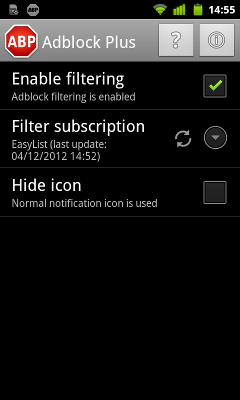More than a few developers have worked to make web browsing and app use in Android as clean and ad-free as possible, but it seems their efforts haven’t made them any fans at Google. That displeasure was made clear today when a number of developers who have created and maintain ad-blocker apps found their wares unexpectedly (and unceremoniously) removed from the Google Play Store.
It’s hard to say exactly how many apps have seen the business end of the banhammer so far, but at least four prominent programs — AdBlock Plus, AdBlocker, AdAway and AdFree — can no longer be downloaded from the search giant’s content market.
Google began sending out removal notifications a few hours ago, and developer Jared Rummler was among the first to share his letter publicly. So far, they all seem to invoke the same argument — these developers are violating part of the company’s Developer Distribution Agreement. Here’s the snippet of the agreement in question:
4.4 Prohibited Actions. You agree that you will not engage in any activity with the Market, including the development or distribution of Products, that interferes with, disrupts, damages, or accesses in an unauthorized manner the devices, servers, networks, or other properties or services of any third party including, but not limited to, Android users, Google or any mobile network operator. You may not use customer information obtained from the Market to sell or distribute Products outside of the Market.
Fortunately, this doesn’t mean that current users of AdBlock Plus, AdBlocker, AdAway and AdFree will have to stop using their beloved apps — it’s just that these developers can’t list them for download in the Google Play Store anymore. Granted, the Google Play Store is easily the most accessible way for prospective users to access these applications, but some devs have alternate methods of getting their apps out there. The folks at AdBlock Plus, for instance, host a downloadable .apk of its Android app on its website, while the developer of AdAway has made the app available in the F-Droid app repository.
I don’t doubt that the developers behind these ad-blocking apps only did so in an effort to improve the browsing experience for their users, but the (pretty broad) legalese they agreed to when listing their apps seems pretty cut and dried in this case. While the goal may have been an altruistic one, blocking ads that other developers (and Google, of course) rely on for revenue sure looks like a case of interference even if it’s not entirely intentional.
Still, this whole exchange has left a bitter taste in some developers’ mouths. Till Faida, co-founder of AdBlock Plus, told me he didn’t feel the app was in violation of the terms at all: “Users should have a right to control what kind of content they want to allow on their devices just like you can deactivate JavaScript or Flash in your browser if you choose to do so,” Faida argued.
“Google’s alleged differences to Apple in terms of freedom and choice don’t hold up when it comes to revenues,” he added. Google has declined to comment on the matter.
Update: AdBlock Plus has now put out a statement criticising Google’s “unilateral move” to kick ad blockers out of the Play Store.
